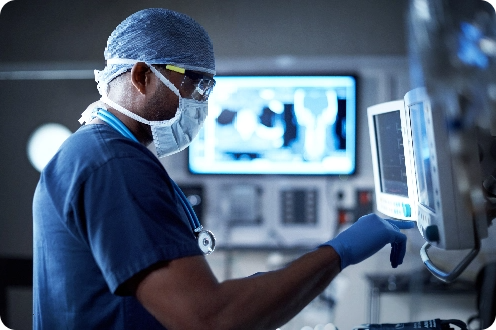Sleep Disorders Treatment
Baptist’s Sleep Disorders Centers provide diagnostic services and treatment to patients who show symptoms of a sleep disorder. More than 5,000 sleep studies are performed annually across Baptist’s network.
More than 80 sleep disorders can affect sleep. Common disorders monitored in the sleep center are obstructive sleep apnea, snoring, periodic limb movements, narcolepsy and insomnia. Some studies indicate chronic sleep loss also may contribute to diabetes, heart disease, obesity and other age-related chronic disorders.
Common Sleep Disorders
Baptist’s Sleep Disorders Centers treat a variety of sleep-related problems and disorders, including the following:
- Obstructive Sleep Apnea is a nighttime breathing disorder. Signs of this disorder include loud snoring, abnormal breathing and excessive daytime sleepiness. Lung problems, heart problems and stroke may complicate this disorder. Sleep apnea has been linked to serious cardiovascular problems.
- Restless Legs Syndrome and Periodic Limb Movement Disorder are discomforts or twitching in the legs that occurs after going to bed and causing sleep disruption. Restless legs syndrome can be seen in up to 30% of patients older than age 65.
- Narcolepsy is a disorder of excessive daytime sleepiness, characterized by sudden and uncontrollable attacks of deep sleep.
- Parasomnias are disruptive sleep-related behaviors that range from night terrors to sleepwalking.
- Insomnia is the chronic inability to fall asleep or remain asleep for an adequate length of time.
Sleep Diary
If you think you might have a sleep disorder, download, print, and maintain this sleep diary to log activities relevant to your sleep quality. Having this information ready will help our sleep experts with diagnosing and treating your disorder.
Sleep Diaries
Types of Sleep Studies
Daytime Nap Testing: The Multiple Sleep Latency Test (MSLT), also known as daytime nap testing, measures how quickly you fall asleep in a quiet environment during the day. This test is often used to diagnose narcolepsy and other disorders of excessive daytime sleepiness. MSLT typically follows an overnight sleep study and includes several scheduled naps throughout the day to assess your sleep latency and sleep patterns.
Polysomnography (PSG): Polysomnography is the standard overnight sleep study used to diagnose sleep disorders. It monitors brain waves, oxygen levels, heart rate, breathing and movements during sleep. This comprehensive test helps diagnose such conditions as sleep apnea, narcolepsy and restless legs syndrome.
Home Sleep Apnea Tests: For those who prefer the comfort of their own home, home sleep apnea tests are available. These tests involve portable monitoring devices that track breathing patterns, oxygen levels and heart rate. Home sleep apnea tests are convenient and can be an effective alternative for diagnosing sleep apnea.
Preparing for a Sleep Study
Before the Study
- Avoid caffeine and alcohol for at least eight hours because they can affect sleep patterns.
- Follow any specific instructions from your health care provider regarding medication use.
- Pack items for an overnight stay, including comfortable sleepwear and personal hygiene products.
During the Study
- Expect to have sensors attached to your scalp, face, chest and legs. These sensors monitor various physiological parameters while you sleep.
- The sleep study environment is designed to be comfortable, similar to a hotel room, to help you rest as naturally as possible.
Understanding Sleep Study Results
The data collected during a sleep study provide valuable insights into your sleep patterns and potential disorders. Results may include information on brain activity, heart rate, breathing irregularities and limb movements. These insights help in diagnosing conditions, such as obstructive sleep apnea, periodic limb movement disorder and REM sleep behavior disorder.
Follow-Up Care and Treatment Options
After the sleep study, a follow-up visit with your health care provider will be scheduled to discuss the results. Treatment options may include lifestyle changes, continuous positive airway pressure (CPAP) therapy for sleep apnea, medication or other interventions based on your diagnosis. Ongoing support and adjustments to treatment plans are crucial for managing sleep disorders effectively.
Sleep Disorders Center Locations
Baptist’s Sleep Disorders Centers use advanced digital technology and highly trained technicians to offer all-night polysomnographic monitoring and daytime nap testing. Testing is individualized based on the patient’s needs.
-
Mississippi Baptist Medical Center
MAP1225 North State StreetJackson, MS 39202 -
Baptist Memorial Hospital-Booneville
MAP100 Hospital StreetBooneville, MS 38829 -
Baptist Memorial Hospital-Collierville
MAP1500 W Poplar AveCollierville, TN 38017 -
Baptist Memorial Hospital-DeSoto
MAP7601 Southcrest ParkwaySouthaven, MS 38671 -
Baptist Memorial Hospital-Golden Triangle
MAP2520 5th StreetNorth Columbus, MS 39705 -
Baptist Memorial Hospital-North Mississippi
MAP1100 Belk BoulevardOxford, MS 38655 -
Baptist Memorial Hospital-Union City
MAP1201 Bishop StreetUnion City, TN 38261 -
Baptist Memorial Hospital-Union County
MAP200 Highway 30 WestNew Albany, MS 38652 -
Sleep Disorders Center
MAP
A service of Baptist Carroll County205 Hospital DriveMcKenzie, TN 38201


